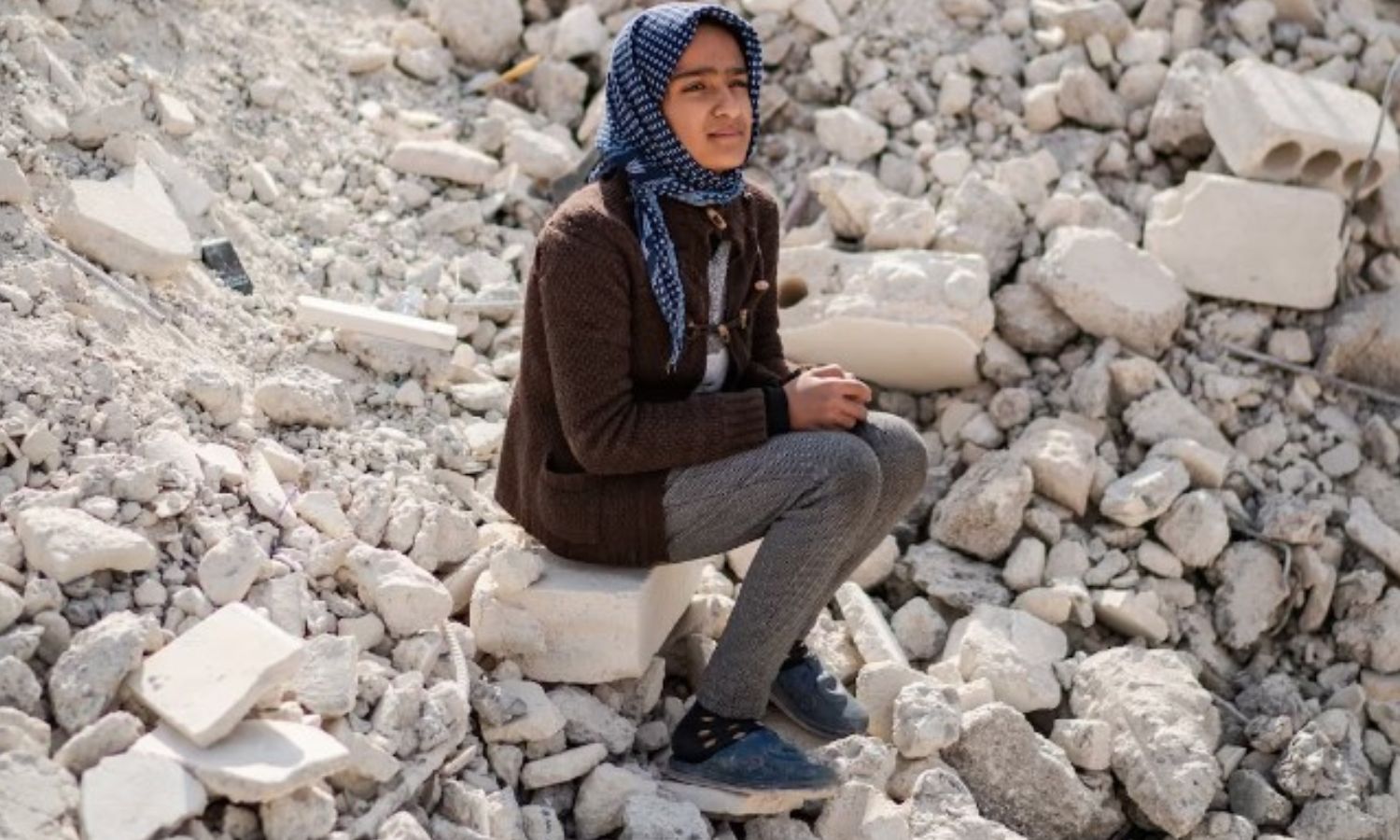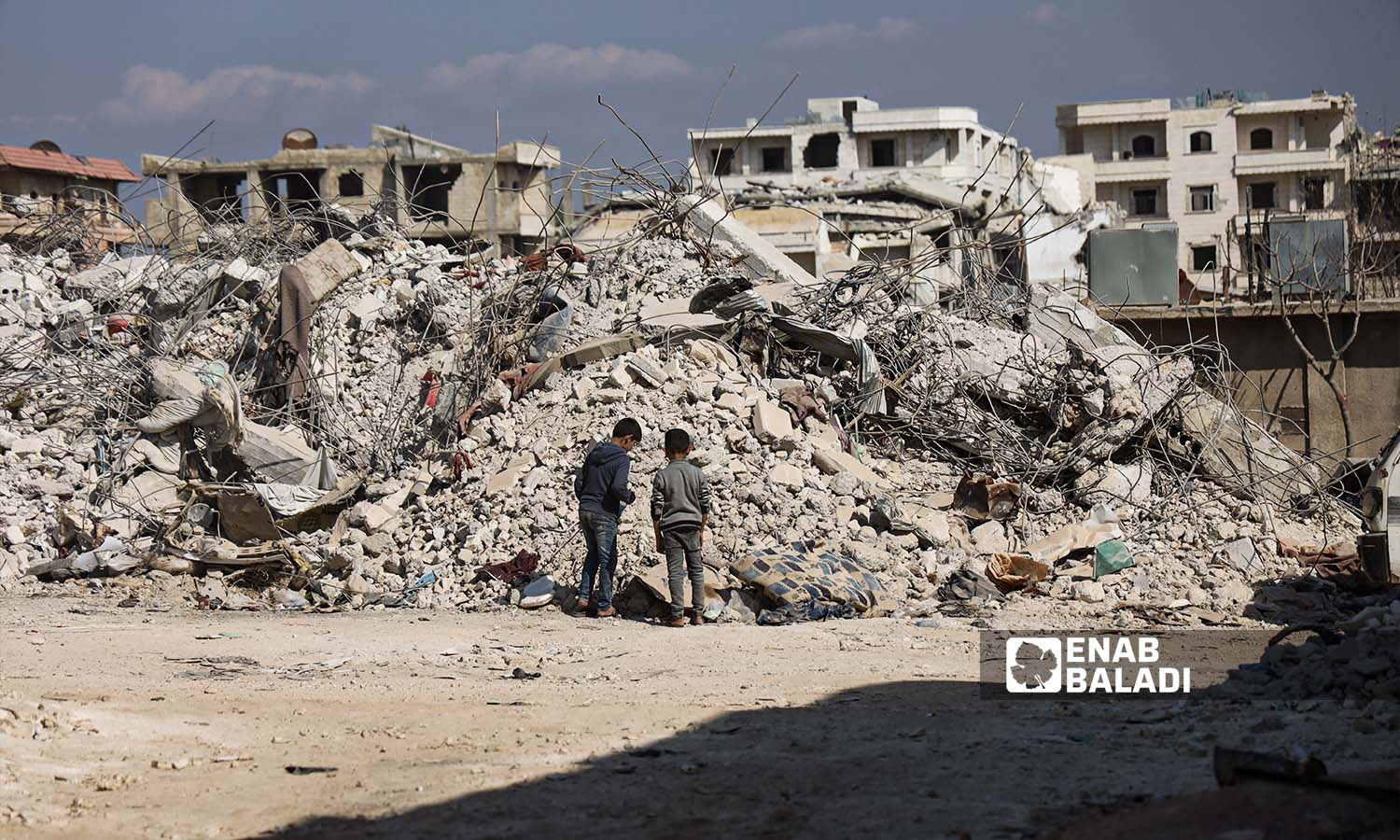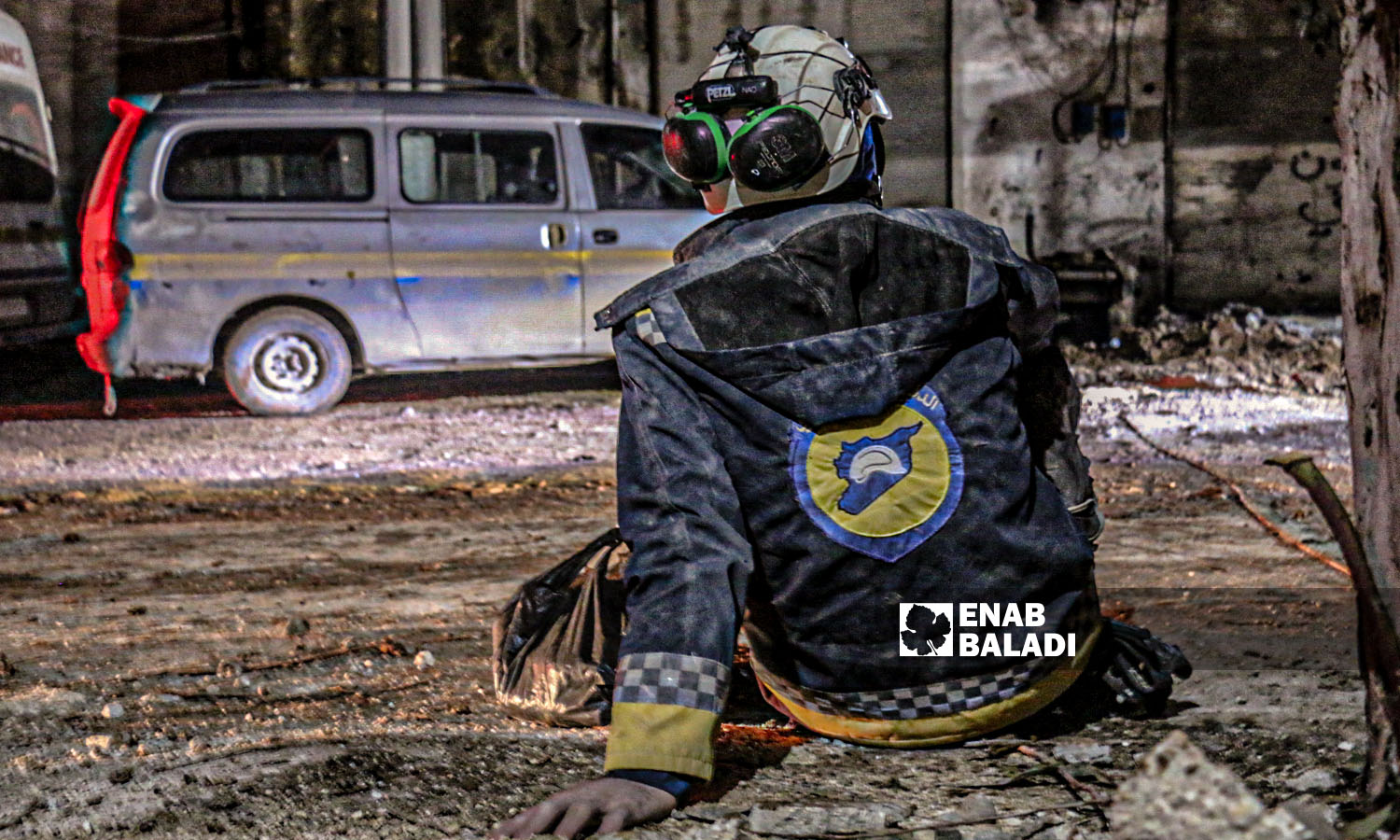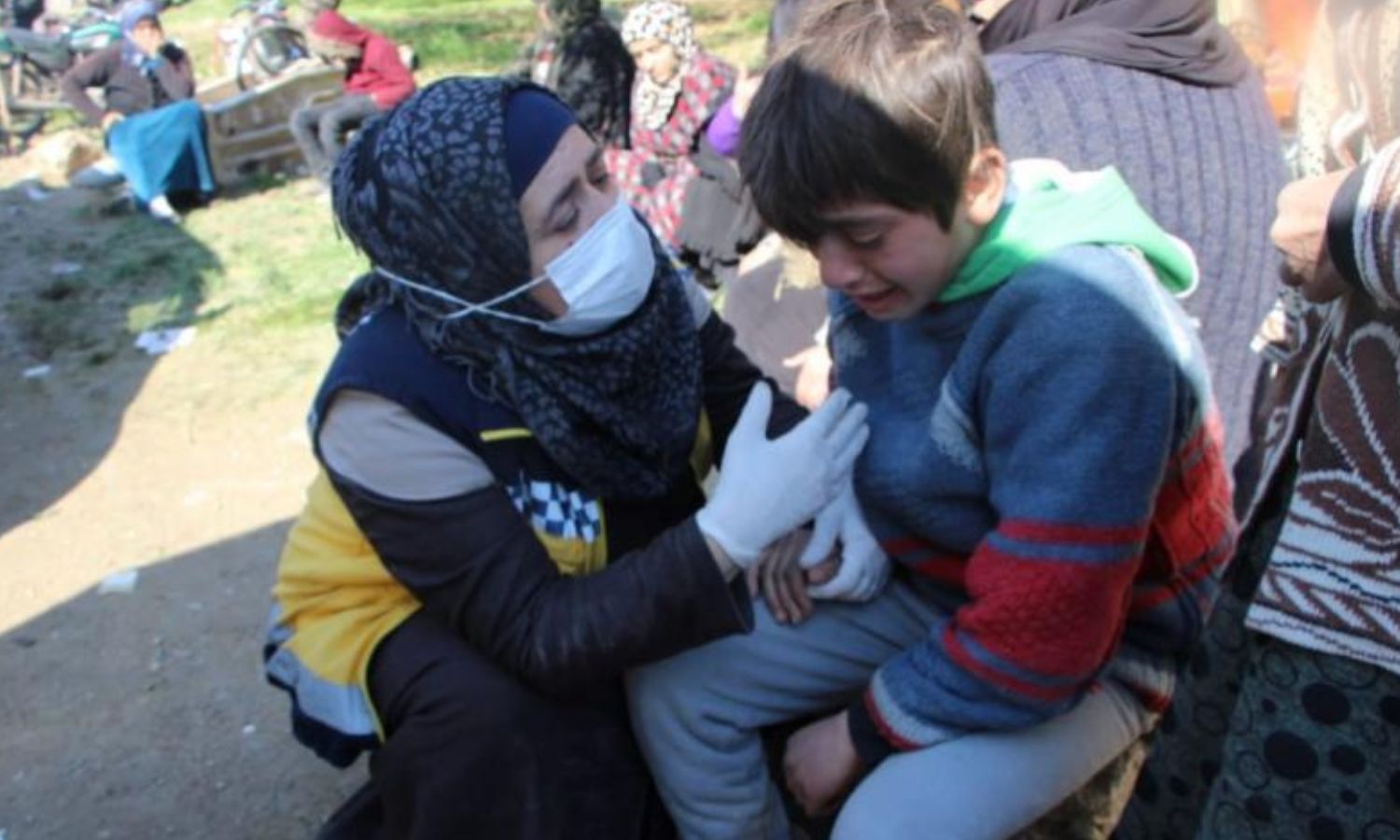



Lujain Mourad | Hussam al-Mahmoud | Khaled al-Jeratli
Moments that the survivors described as “doomsday” affected the details of life in the earthquake-affected cities, leaving clear physical and psychological damage, the true impact of which has not yet been fully revealed.
Cases of panic and complaints of various forms of psychological disorders began to gradually appear among the people in northwestern Syria, without excluding children as well, amid warnings of a second catastrophe that may result from the lack of response to the psychological damage that affected the survivors.
In light of the urgent needs for mental health services, a report issued by the International Federation of Red Cross and Red Crescent Societies (IFRC) described the disaster of the earthquake that struck Syria and Turkey as a “time bomb” threatening the mental health of those affected in both countries.
In this file, Enab Baladi discusses with psychiatrists, psychologists, and concerned authorities the size of the needs for mental health services. It also discusses the extent to which the residents of northern Syria are willing to receive these services amid the high frequency of previous needs and the emergence of others created by the disaster.
Enab Baladi also explores the extent of the mental health sector’s readiness to absorb the disaster and the priority of receiving psychological treatment from the point of view of a society with diverse sufferings.
Two weeks after the devastating earthquake, on February 20, a 6.4 magnitude earthquake struck the Defne region of the Turkish state of Hatay, leaving limited damage in northwestern Syria, but it re-evoked scenes of horror at a time when the region was heading to heal its wounds and deal with the current crises that were created or exacerbated by the earthquake.
“Today, my daughter refuses to talk and refuses any interaction with people, even with me,” Fatima al-Arnous told Enab Baladi from a hospital room where she was gathered with her two injured children in Idlib city.
Al-Arnous and her two children are still receiving the necessary treatment for fractures or wounds that affected their bodies a month after the earthquake. The mother is also living in a constant state of anxiety about the psychological damage that one of her two daughters is facing.
“All injuries can be treated, but my real fear is directed at my daughter’s psychological condition,” al-Arnous continued, pointing out that their physical health has begun to improve, but her daughter’s psychological condition, which she is unaware of, has not witnessed any positive development during the past days.
With the earthquake spreading to large areas in northern Syria, the children of Ramadan Suleiman, who reside in the border city of Azaz, also suffer various psychological effects, as they refuse to return to their home more than a month after the disaster.
“Since the earthquake occurred, we have been waking up every day to the screams of my little boy, begging us to save him from the nightmare of the earthquake,” Suleiman told Enab Baladi.
In an opinion poll conducted by Enab Baladi in the cities of Idlib and Azaz, most of the opinions agreed that fear has become part of the details of the daily lives of adults and children in the region.
Fear resulted in varying effects, which in some cases reached the inability to practice the daily routine for adults, while it had a multiplying effect on children, as many of them suffer from sleep and speech difficulties and loss of appetite, according to the survey.

A child sitting on the rubble of her destroyed house in Jindires – February 14, 2023 (The Washington Post)
“Normal symptoms of an abnormal event” Psychiatrist Mohammad Abu Hilal describes what the earthquake survivors in Syria and Turkey are going through.
Abu Hilal said, during an interview with Enab Baladi, that psychiatry after disasters, including the earthquake, avoids talking about psychological disorders, in the “acute period” that ranges from weeks to months after the disaster, with a focus on reassuring people, justifying that the state of fear can increase when talking about mental illness.
This opinion is agreed with by psychiatrist Jalal Nofal, as he believes that many symptoms can be normal, especially in light of the ongoing disaster.
Nofal explained that the continuation of aftershocks and the existence of rumors about an expected earthquake impose the continuity of these symptoms for a longer time.
According to a report issued by Doctors Without Borders/Médecins Sans Frontières (MSF) titled “After the earthquake is a psychological disaster,” the MSF said all the victims of an earthquake, whether they have lost their home or not, their families, relatives, and other acquaintances or not, have a psychological response.
The MSF added that most of them have a normal response, a response needing certain attention and information. Other cases present a more severe response which is different in each case, depending on the person and what he/she has had to endure.
This level of symptoms requires psychological support sessions, special attention, and care to avoid exacerbation of the problem, according to the report.
What are the psychological consequences caused by an earthquake?
Initially people are shocked. They do not believe what has happened. They experience fear. Some have sleeping problems. Even nightmares occur. Others are constantly preoccupied with what has happened. Some people try to avoid everything that is related to the event.
They do not want to speak about it, they avoid smells and sounds; sometimes they even avoid people who make them think of the event.
Children change their behavior, become restless, irritable, aggressive, silent. They also need to be constantly with their parents, suffer from insomnia, regression to a previous stage of life (sucking their thumbs, enuresis).
Source: MSF
While some of the symptoms experienced by the earthquake survivors may be casual, temporary and normal, it is expected that chronic diseases and conditions that require medical intervention will appear, according to Dr. Jalal Nofal.
In addition, the Doctors Without Borders report indicates the possibility of continuing the impact of these cases in the long term and its impact on the family and society as a whole,
In addition, the impact of these cases on society can cause an increase in drug use, an increase in marital problems, and the emergence of additional problems related to violence and aggression in the event that they are not responded to with the required speed.
Common reactions in adults after a disaster:
– Trouble falling asleep or staying asleep.
– Sadness, depression, hyperactivity, irritability or anger.
– Having no feelings at all or feeling numb.
– A lack of energy or feeling exhausted all the time.
– Lack of appetite or, the opposite, eating all the time.
Source: American Psychiatric Association
The most prominent severe symptoms that survivors of natural disasters can experience:
– Depression.
– Psychosis
– Physical symptoms that have no organic explanation
– Post-traumatic stress disorder
– Relapses in pre-existing mental illness
Source: MSF
“12 years of war, followed by an earthquake, poverty and oppression, who feels the comfort of living? Where is the money to visit the psychiatrist? Should I eat or visit a psychiatrist?”
Ziad Ghannoum, with his unanswered questions, summarizes the scene that Syrians live in in northwestern Syria before and after the earthquake, where life’s conditions and hardships are similar at the same time.
The head of the family, who resides in the countryside of Idlib and one of the survivors of the disaster, explained to Enab Baladi that there is a state of panic, terror, and fear after the earthquake. He also emphasized the family’s fear for the children in the first place, given that they do not know how to protect themselves in the event of an emergency.
Ghannoum said that fear has continued since the earthquake occurred, and the sensitivity of adults towards what is related to this event has increased, which is reflected in children who are already afraid. After 12 years of war, people no longer have a sense of reassurance or peace of mind, and tensions are always present, he said.
Ghannoum has to choose between basic needs such as securing food or undergoing psychological treatment, although he realizes its importance for different age groups in northwestern Syria. He is pushed to do so by the living and economic conditions, the severity of which was exacerbated by the earthquake.
Ghannoum’s opinion intersects with a group of other opinions polled by Enab Baladi in the field, which stressed, in general, the existence of a state of terror and great fear of a recurrence of the earthquake.
Although some of the respondents accepted the idea of seeing a psychiatrist, and others rejected it for social reasons or for an automatic feeling of improvement, some people indicated their financial inability to see a psychiatrist.
At the same time, they indicated a prioritization that does not place psychiatric treatment at the top of the scale of needs, which is reinforced by the high fees required for treatment sessions of this kind in light of the acute shortage of specialized doctors in the region.
Fatima al-Arnous, whose daughter suffers from many psychological effects, justified not seeking psychological support for her daughter by an opinion, whose source she did not explain, that these effects will disappear with time.
“In our lifetime, we have never been to a psychiatrist. It is enough for us to read the verses of the Qur’an, and God will give us patience,” added al-Arnous.
Muhammad al-Ali, the psychiatrist and supervisor of the UOSSM medical center, told Enab Baladi that the people’s demand for psychological treatment in the region is “acceptable,” but the issue requires more education and awareness.
Al-Ali explained that there are those who consider psychiatric treatment to be associated with a societal “stigma,” which makes raising awareness of the importance of treatment and correcting those wrong beliefs a priority at the present time.
This is also confirmed by Dr. Jalal Nofal, who considered “wrong social beliefs” a reason for some people to exclude the idea of receiving treatment or psychological support in the north.
Nofal added that many people prefer to see people who practice “sorcery” rather than a specialist, which exacerbates problems on an individual and societal level.

The streets of Jindires town in the countryside of Aleppo after the Feb-6 earthquake that struck northwestern Syria – February 24, 2023 (Enab Baladi/Amir Kharboutli)
Due to the limited support provided to facilities on the one hand, and the absence of specialized medical personnel to meet the needs of the region on the other hand, the medical sector in northwestern Syria suffers from great problems and pressures.
The psychiatric sector is one of the most prominent sectors that are not qualified to accommodate the needs of the region, especially in light of a disaster that exacerbated the needs, according to information obtained by Enab Baladi from several sources working in the sector.
The accumulation of suffering for the residents of northwestern Syria doubled the need to strengthen the psychiatric sector in the region even before the earthquake occurred, especially since more than half of the region’s population were displaced from other regions and suffer the consequences of the ongoing conflict in Syria.
Munther al-Khalil, a research doctor in a research project to strengthen the health system in northern Syria and the former Idlib health director, told Enab Baladi that the mental health of residents in the region represents a “major challenge,”, especially for people who are subject to persecution, such as women, children, the elderly, and people with disabilities.
He added that the significant increase in the number of suicides recorded at the health facilities level, “despite the absence of an official announcement,” is evidence of this.
Active rooms and identifiers through the Telegram messaging service in northwestern Syria frequently publish news about suicide cases that are repeated from time to time, the victims of which are young people most of the time.
Mental health services in Syria as a whole suffer from great challenges, according to the doctor, such as an acute shortage of funding and human resources, unstable security conditions, lack of experience and training, and the lack of adaptation of mental health services to suit society’s norms, culture, and needs.
The director of the Primary Care Directorate in the Idlib Health Directorate, Doctor Muhammad Msatat, told Enab Baladi that the catastrophic effects of the earthquake were, of course, reflected on the psychological level.
As the first effect that appeared after the earthquake on the psychological level, according to Msatat, the percentage of “panic disorder” and “anxiety disorder” (PTSD) increased among the residents of the region.
The impact of the disaster was exacerbated by a weakness in the medical sector, especially in terms of psychiatric services, according to the doctor, who attributed the main obstacles to managing such cases to the lack of specialized cadres undergoing psychiatric training, in addition to the recent loss of some of these cadres due to the earthquake.
Concerning the areas administered by the Syrian Interim Government (SIG) in the north of Aleppo governorate, the Minister of Health, Dr. Maram al-Sheikh, said that the medical sector’s overall interest focused on securing therapeutic intervention related to “saving a life,” while the ministry did not have accurate statistics on the number of workers in the psychiatry sector in the northern regions of Aleppo.

An exhausted volunteer from the Syria Civil Defense agency during rescue operations for earthquake victims in the Jindires area in Afrin countryside, northwestern Syria – February 7, 2023 (Enab Baladi/Dayan Junpaz)
Doctor Munther al-Khalil told Enab Baladi that the weakness of this sector dates back to more than ten years and worsened during the war, as there is no single integrated center in northwestern Syria that provides psychiatric services.
In light of the ongoing emergency needs, organizations and healthcare providers usually tend to provide life-saving services at the expense of other services, including psychiatric services, according to al-Khalil.
|
It is necessary to give mental health special concern by decision-makers in the health sector, including psychological care by medical personnel, with the need for international organizations and governments to provide support to strengthen the capacity of this sector. Munther al-Khalil A research doctor in a research project to strengthen the health system in northern Syria and the former Idlib health director. |
During the first days of the earthquake, hospitals and medical centers in Syria responded to the crisis at their maximum capacity in terms of equipment and staff, despite the huge deficit suffered by the medical sector in general.
The Minister of Health, Dr. Maram al-Sheikh, told Enab Baladi at the time that the hospitals in the region are operating at maximum capacity in the midst of declaring a state of emergency and alert, which includes ambulance systems, hospitals, and full medical personnel.
This years-old shortage appears, as stated in a previous research prepared by the Hope Revival Organization (HRO) in 2019, as the researchers concluded that psychosocial support programs in Syria are “somewhat acceptable,” but they do not cover the need.
Dozens of organizations worked to respond to the disaster and provide psychological support services, including the Hope Revival organization, as its workers received civilians suffering from psychological disorders resulting from the trauma they went through.
According to what the organization told Enab Baladi, its intervention in the field of psychological support was divided into two parts. The first is non-pharmaceutical psychosocial support, and is implemented by a psychosocial supporter or a psychologist who assesses the psychological situation of the patient and provides him/her with initial psychological aid and individual sessions that include some techniques to help them cope with stressors and responses caused by the traumatic event.
While the second part includes pharmacological treatment under the supervision of a psychiatrist who prescribes the appropriate medication for each case and follows up on the level of improvement in coordination with the psychologist.
The psychiatrist and supervisor of the UOSSM medical center, Muhammad al-Ali, told Enab Baladi that workers in the sector suffer from a severe shortage in psychological support teams, despite the urgent need in this aspect recently, and the lack of expertise necessary to deal with the post-traumatic stage hindered the response to the crisis facing the region.
Al-Ali also indicated that capacity-building in the field, and the development of competencies with the necessary training to deal with crises, is a necessity that the region needs.
The MSF report warned of the impact that the disaster could have on workers in organizations that provide psychological support services, recommending that these people not work for more than six consecutive days.
Jalal Nofal, a psychiatrist working within the German-Syrian Society, said that the employees of the organizations that provide psychological support services earlier became victims of the disaster.
The doctor explained that the workers in that sector are now in need of support and counseling to avoid them reaching a state of “psychological burnout.”

A White Helmets volunteer consoles a child boy who was waiting for his friend’s body to be recovered from under the rubble in the village of Azmarin, northwestern Syria (The Syria Civil Defense)
Northwestern Syria lives in a complex reality that does not give residents of the region the luxury of thinking and seeking psychological treatment for psychological problems or symptoms that may occur to a person, regardless of the time factor before or after the earthquake.
Numbers and statistics show that most of the population does not meet the minimum pyramid of human needs identified by the psychologist Abraham Maslow in the book “Motivation and Personality” in 1954, and the most urgent of them in the first place are physiological needs (mainly food and drink), which places the sense of security, which is associated here with psychotherapy relatively, at a higher level on the scale of needs.
4.6 million people live in northwestern Syria, 4.1 million of whom need assistance, and 3.3 million people suffer from food insecurity. Of 2.9 million displaced people, 1.9 million people reside in camps, according to data from the United Nations Office for the Coordination of Humanitarian Affairs (OCHA), released on February 23.
According to estimates by the Syria Civil Defense, about 40,000 families were displaced as a result of the earthquake, and the number of completely destroyed buildings reached about 550, and more than 1,570 buildings were partially damaged, in addition to hundreds of cracked buildings.
At least 55 health facilities were damaged by the earthquake in northwestern Syria, and more than 110 health centers are in need of fuel or medicine.
UN estimates also indicate that there are 280,000 people directly affected by the earthquake and in urgent need of shelter and non-food items.
In front of these numbers, Amer al-Ghadban, a doctor of educational psychology, stressed the existence of a relationship between psychological aid and other types of relief or support after the earthquake.
He also pointed to the focus of attention in the initial period of the disaster on material relief, while the matter requires psychological support and relief, which accompanies from the first day material, food, and medical relief.
In a related context, Dr. al-Ghadban explained that in the post-disaster stage, some psychological symptoms appear, followed by adaptation and recovery, and many obvious symptoms start to vanish, but a group of people suffer psychological symptoms for a longer time, without caring about the situation, hoping to recover like others.
In an interview with Enab Baladi, al-Ghadban pointed out that the exacerbation of the condition may lead a person to severe depression and psychotic illnesses, and cases of this kind appeared during the Syrian revolution due to their neglect after the onset of symptoms.
The weakness of the medical sector, on the one hand, and the high number of injuries and the varying severity of the injuries in the region, on the other hand, reinforced the focus more on the medical side of injuries.
The World Health Organization (WHO) estimates that the needs of the health sector in northwestern Syria amount to 15.7 million dollars, of which 6.7 million dollars are for the provision of medicines and only $700,000 for mental health and psychosocial support.
if you think the article contain wrong information or you have additional details Send Correction